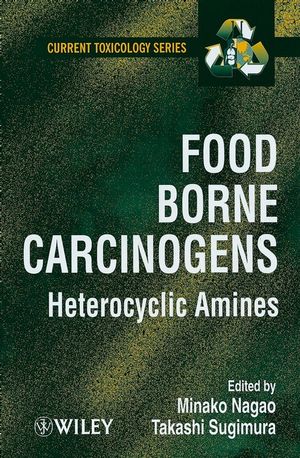Food Borne Carcinogens: Heterocyclic AminesISBN: 978-0-471-98399-6
Hardcover
392 pages
June 2000
 This is a Print-on-Demand title. It will be printed specifically to fill your order. Please allow an additional 10-15 days delivery time. The book is not returnable.
|
||||||
Current Toxicology Series Series Editors Diana Anderson Tno Bibra
International Ltd, Surrey, UK Michael D Waters Consultant, Chapel
Hill, NC, USA Timothy C Marrs Department of Health, London, UK Food
Borne Carcinogens Heterocyclic Amines Edited by Minako Nagao, Tokyo
University of Agriculture, Japan Takashi Sugimura, National Cancer
Center, Japan Food Borne Carcinogens provides a comprehensive
review of the genotoxic and carcinogenic activities of heterocyclic
amines (HCAs) found in cooked foods. This unique and timely
publication describes the latest research and offers an insight
into new developments. Key topics covered include:
* Combination effects of HCAs in carcinogenesis
* Genetic alterations in animal tumours induced by HCAs
* Adduct levels yielded in humans by ordinary exposure levels
* Genetic polymorphisms in HCA metabolic enzymes and suspected individual differences in susceptibility to HCA carcinogenesis
Written by world-renowned experts in the field, this book will be essential reading for toxicologists and cancer researchers working within industry, academia and government, particularly, food scientists, genetic toxicologists, biochemists, nutritionists and those investigating risk evaluation of HCA's and the regulation of environmental carcinogens. It will also be of interest to other scientists involved in the identification of naturally occurring antimutagens and anticarcinogens.
* Combination effects of HCAs in carcinogenesis
* Genetic alterations in animal tumours induced by HCAs
* Adduct levels yielded in humans by ordinary exposure levels
* Genetic polymorphisms in HCA metabolic enzymes and suspected individual differences in susceptibility to HCA carcinogenesis
Written by world-renowned experts in the field, this book will be essential reading for toxicologists and cancer researchers working within industry, academia and government, particularly, food scientists, genetic toxicologists, biochemists, nutritionists and those investigating risk evaluation of HCA's and the regulation of environmental carcinogens. It will also be of interest to other scientists involved in the identification of naturally occurring antimutagens and anticarcinogens.



